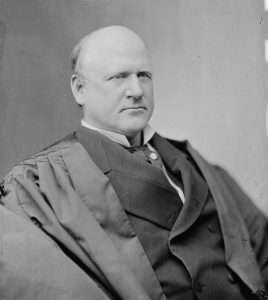The Volokh Conspiracy
Mostly law professors | Sometimes contrarian | Often libertarian | Always independent
Today in Supreme Court History: October 14, 1911
10/14/1911: Justice John Marshall Harlan I dies.

Editor's Note: We invite comments and request that they be civil and on-topic. We do not moderate or assume any responsibility for comments, which are owned by the readers who post them. Comments do not represent the views of Reason.com or Reason Foundation. We reserve the right to delete any comment for any reason at any time. Comments may only be edited within 5 minutes of posting. Report abuses.
Please to post comments


McConnell v. Rhay, 393 U.S. 2 (decided October 14, 1968): Court holds that its rule of Mempa v. Rhay, 1967, that there is a right to counsel in revocation of probation and deferred sentencing proceedings, at least as to felony defendants, is to be applied retroactively (retroactive application is often, though not always, ordered in criminal procedure matters, though it requires a second case with similar facts to come along)
Arkansas v. Tennessee, 311 U.S. 1 (decided October 14, 1940): Court overrules Arkansas’s objections to Special Master report in this original jurisdiction dispute over various avulsion-created islands in the Mississippi River; the opinion introduced me to the terms “towhead” (shoal) and “thalweg” (zigzag line tracing the deepest points of a river bed as one goes downstream, often used to define a border)
In re Isserman, 348 U.S. 1 (decided October 14, 1954): upon rehearing, attorney gets un-disbarred! (had been disbarred after defending Communist Party members in the “Foley Square trial” which he had obstructed with “repetitious and insolent objections”, resulting in contempt and jail and state disbarment; no reason given for welcoming him back to the Bar, presumably not with hearts and flowers)
Gonzalez v. Roman Catholic Archbishop of Manila, 280 U.S. 1 (decided October 14, 1929): in dispute over income from a Will which reached the Supreme Court of the Philippines (an American territory at the time), Court holds that First Amendment Free Exercise Clause prohibits civil courts from interfering with decisions of canonical authorities, even those affecting civil rights, absent fraud, collusion or abritratriness (extended by Serbian Eastern Orthodox Diocese v. Milivojevich, 1976, in which the Court said that not even arbitrariness would be examined) (this was the beginning of the “ministerial exception” to civil rights laws which has allowed Catholic institutions to fire gay teachers)
"Gonzalez v. Roman Catholic Archbishop of Manila"
Are you sure they used the First Amendment?
I took it as implicit, not explicit, though given the second sentence of the quotation below, perhaps it's more an impairment of contracts case than a Free Exercise case.
"In the absence of fraud, collusion, or arbitrariness, the decisions of the proper church tribunals on matters purely ecclesiastical, although affecting civil rights, are accepted in litigation before the secular courts as conclusive, because the parties in interest made them so by contract or otherwise. Under like circumstances, effect is given in the courts to the determinations of the judicatory bodies established by clubs and civil associations." Id. at 7.
Gonzalez v. Roman Catholic Archbishop of Manila was written by Justice Brandeis, a Jew.
It is interesting it was handed down on 10/14 since it was argued on Argued April 8/9, 1929.
By chance, I recently read “Beyond Belief, Beyond Conscience: The Radical Significance of the Free Exercise of Religion” by Jack Rakove. He notes that 19th Century courts repeatedly had to settle legal disputes arising from church disputes.
It developed that courts tried to use neutral principles. See, e.g., Watson v. Jones (1872):
Conscious as we may be of the excited feeling engendered by this controversy, and of the extent to which it has agitated the intelligent and pious body of Christians in whose bosom it originated, we enter upon its consideration with the satisfaction of knowing that the principles on which we are to decide so much of it as is proper for our decision, are those applicable alike to all of its class, and that our duty is the simple one of applying those principles to the facts before us.
Rakove notes in his book many of the current religious disputes are contemporary ones — the original disputes involving free exercise were more limited. Disputes about exemptions from contraceptive mandates, suffice to say, cannot simply be decided by trying to investigate original understanding.
The book is interesting overall though for some reason does not reference the no religious tests clause.
Thanks!
A conspirator wrote a book about Lochner with the cover having Holmes being knocked out. I overall found Harlan's dissent for three justices somewhat more impressive, including because it showed a moderate path by someone who granted a right to contract.
Harlan was replaced with Mahlon Pitney. Someone with high "who?" energy. Pitney was followed by Sanford ... same.
(I believe Sanford's wife was named "Elizabeth." Joke.)
I never understood the fuss about Holmes's dissent. He talks about the Court's decision being based on an unpopular economic theory but the decision doesn't mention any economic theory or even hint at it.